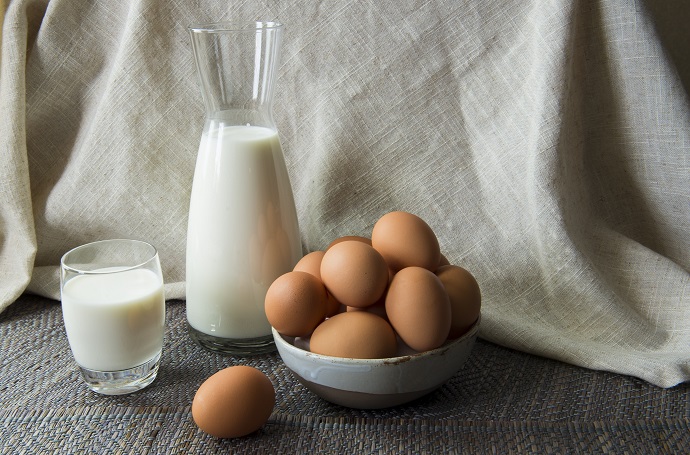SAGE Standard: “We use antibiotic- and hormone-free milk and cage-free, Certified Humane® eggs.”
What We Do
We exclusively purchase milk from farms that treat individual cows with antibiotics only in response to a diagnosed illness, rather than prophylactically treating the entire population, and never give them artificial hormones. During processing, the milk of antibiotic-treated cows is tested for the presence of residual antibiotics, and the milk only comes to us if it’s entirely free of antibiotic residue and artificial hormones.
In addition, we only purchase eggs from providers whose laying hens were raised cage-free according to Certified Humane® standards, which set a high standard of animal care and wellbeing.
Why We Do It
There are two main motivations behind our standards— human health and animal welfare.
First, let’s address how our standards benefit our (human) clients. In terms of milk specifically, the introduction of rBGH, an artificial hormone that induces cows to produce more milk, slightly raises the levels of a cell-growth hormone in humans, which may be linked to the formation of some cancers. In addition, and perhaps more importantly, any antibiotic use in animals increases the likelihood of antibiotic resistance and eventual transfer to humans—so the fewer laying hens and dairy cows we treat unnecessarily, the fewer humans (and animals) will suffer from incurable infections.
Now for the cows. Hormonal irregularities can make cows sick, just the way they do humans. In fact, rBGH increases cows’ rates of udder infection, which, in addition to causing the cow discomfort, leads to increased administration of antibiotics. The related prophylactic use of antibiotics—to preempt those same infections—in cattle stocks contributes to antibiotic resistance in cow populations.
Additionally, some, but not all, of our milk comes from organic cows. Cows raised under USDA Organic conditions, which dictate an absence of artificial growth hormones and prophylactic antibiotics, experience a better quality of life. As a result of a 2010 USDA rule for the legal definition of organic milk, “producers are now required to provide ruminant livestock with year-round access to the outdoors … and pasture throughout the grazing season for their geographical location.” That’s 120 to 365 days of outdoor grazing, as opposed to a life of limited motion indoors.
And lastly, the hens. Unlike hens confined in small laying cages, cage-free hens have unrestricted access to food and water, and have the freedom to move around within an indoor space during the laying season. Because cage-free hens are less densely packed, diseases and parasites spread more slowly among them, so they require antibiotics less frequently. They’re also less prone to osteoporosis because they have an opportunity to engage in weight-bearing exercise.
Certified Humane® standards further improve the quality of the hens’ lives. Certified Humane® eggs are laid by chickens who have free access to a fresh, wholesome, calcium-rich diet free of non-egg animal byproducts. The chickens only receive antibiotics as a result of a veterinarian-diagnosed illness. Their environment must be clean and relatively spacious with regular periods of light and darkness, adequate ventilation, and appropriate temperatures. Their caretakers must monitor them regularly for pests, illness, and injury. They spend less time suffering from illness, injury, and discomfort, and more time living life like they would naturally.
Our standards create better lives for the animals who give us our milk and eggs, and help to keep our communities healthier. Sounds like a win-win to us.







